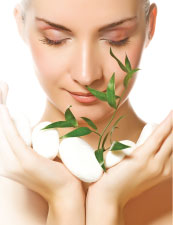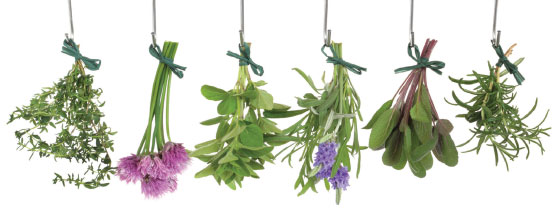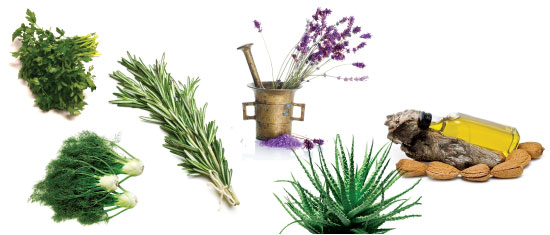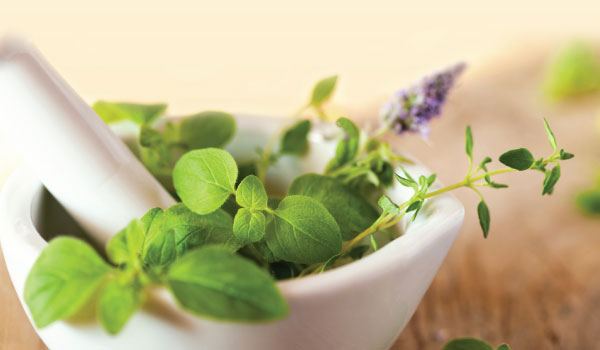Herbs and naturally grown products aren’t just for eating. They boast a whole range of advantages for your skin as well and they don’t have the same chemicals and risks as other products.
 As the world is making more of an effort to be greener, we are also looking to be healthier with ourselves. We are more aware of what we are eating and what we are using on our skin, in fact words such as ‘organic’ and ‘natural’ have become a regular part of conversation. The cosmetic industry is still booming, but there is also a gradual resurgence of skincare experts going back to the basics and harnessing the healing agents found in natural herbs.
As the world is making more of an effort to be greener, we are also looking to be healthier with ourselves. We are more aware of what we are eating and what we are using on our skin, in fact words such as ‘organic’ and ‘natural’ have become a regular part of conversation. The cosmetic industry is still booming, but there is also a gradual resurgence of skincare experts going back to the basics and harnessing the healing agents found in natural herbs.
Most women’s bathroom shelves are lined with moisturisers, serums, exfoliators, gels and cleansers. Each morning and evening we grab the products we have become accustomed to using, but how many of us actually know what is in the products we so routinely apply to our skin?
An age-old routine
Herbal skincare has been around for thousands of years longer than the use of synthetic products. Yet even today, there isn’t much education available on the benefits of individual herbs and so many people are unaware of how simple and how much better for your skin it is to “go natural”.
Long before pharmaceutical companies began mixing chemicals to create beauty products, our population used pure ingredients to soothe skin irritations, boost the complexion, protect from the sun and to beautify. Middle Eastern and African women have been using henna as a way to paint their skin for years, whilst centuries ago in England the women used cypress powder to whiten the skin. All over the world, specific products have been known to achieve certain effects, getting the same results as the chemical solutions available, but without the same risks.
It can take some research and dedication, but herbal remedies are clear about what ingredients are combined and to date there have not been complaints of side effects or harmful results — why else would the “mother nature knows best” be so widely popular?
Meet the herbs
Knowledge is the key to letting herbal remedies help you. If you understand the properties of the herbs, it is simple to select the herbs to suit your skin’s needs. Best of all, the herbs can easily be grown in your garden, on your kitchen windowsill or found in a number of natural cosmetic lines. If in doubt, it is always best to consult a dermatologist or an aromatherapist who will be able to professionally decide which plants are the correct ones.
NATURAL COSMETIC PRODUCTS
As not all of us have time or space to grow herbs, but there are many products on the market which are 100 per cent natural and subsequently contain all of the goodness of the raw ingredient. Parisian brand Decléor combines the purest, most potent and natural extracts to create everyday and easy-to-use products. The company’s expertise in cosmetic aromatherapy is based upon deep studies of the benefits of using plants and herbs, through the careful selection of natural ingredients and active concentrates. Burt’s Bees and Ren are two more brands commonly found in cosmetic shops that create natural skincare products, primarily from oils. None of the mentioned lines use any parabens, synthetic fragrances, petrochemicals or, in fact, anything unnatural or harmful.
The Maha D’Line Aroma and Beauty Centre here in the Kingdom is also a recommended go-to for a consultation. Owner Maha steers ladies towards better health and beauty by instructing them on exactly which natural products are used on their skin and what the finished result will be.
The centre considers the creative and rejuvenating qualities that nature provides and creates personalised programmes for each customer, dependent on their exact skin type.
You can indulge in a range of beneficial body and facial treatments, including chocolate wraps and masks, oxygen facials, herbal henna hair applications, acne cures and Chinese face lifts. Best of all — it’s all from nature’s own remedies.

THE CLEANSERS
Lemon Balm. Used as a facial steam, the leaves from the lemon balm plant are a proven acne treatment and an infusion of the leaves makes a good toner.
Rosemary. The aromatic oil from this shrub contains strong cleansing and rejuvenating qualities, which are particularly effective on oily and dull skin types.
Thyme. This herb is often found in toning products as it is great at improving skin tone and also posseses cleansing attributes, ideal for gently healing acne.
THE SOOTHERS
Aloe vera. There is a reason why this plant is so recognisable; the liquid gel it produces is most commonly used on sun burnt skin and soothes a number of irritations.
Cocoa butter. Widely known for assisting in minimising stretch marks, this natural vegetable fat contains Vitamin E, a proven skin-nourishing antioxidant.
Eucalyptus. This versatile oil is added to a number of products that treat skin problems. It has a soothing effect on the skin and reduces rashes and irritations.
THE ANTISEPTICS
Lavender. With both antiseptic and anti-fungal benefits, lavender primarily helps to reduce scarring and speeds healing due to its cleansing function.
Calendula. Marigold flowers are often used to help combat eczema, scars and cracked skin. It’s a strong antibacterial that will also help heal many irritations and cuts.
Fennel. In addition to containing antiseptic properties to heal scarring and rid you of spots, fennel oil is used to tone mature skin and reduce water retention.
THE BEAUTIFIERS
Elder tree. Every part of this magical tree — the bark, leaves, flowers and berries — is beautifying. Sunburn, blemishes and freckles are removed, leaving soft and supple skin.
Strawberry plant. Despite its misleading colour, the juice of the strawberry removes tartar from the teeth and whitens them.
Almond oil. In addition to being sweetly scented, almond oil softens and conditions most skin types to leave a smooth and clear complexion.






































